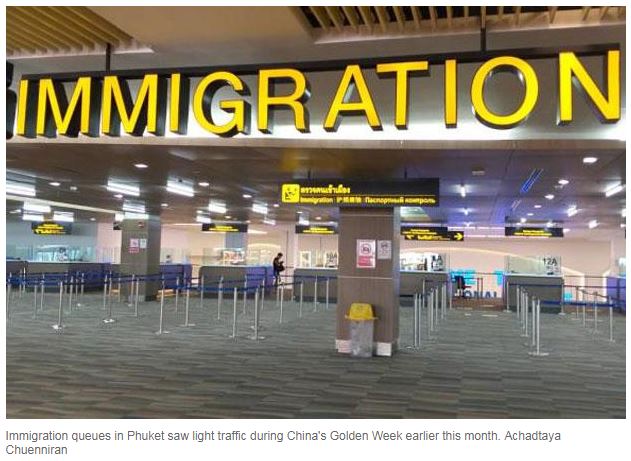Thailand: Ministry backtracks on visa fee waiver plan
The government’s plans to exempt tourists from visa-on-arrival fees to attract foreign travellers is unlikely to happen this year, according to Tourism and Sports Minister Weerasak Kowsurat.
He said at a meeting with the private sector on Thursday that Chinese tourists have already finished their travel planning for the high season this year and will resume their overseas trips during Chinese New Year, which falls in early February.
On Wednesday, Deputy Prime Minister Somkid Jatusripitak instructed the Tourism Authority of Thailand (TAT) to discuss plans with the Immigration Office to exempt tourists from 21 nations from visa-on-arrival fees in the remaining two months of this year.
The idea is to exempt Chinese visitors from the 2,000-baht visa fee in a bid to stem falling numbers after the July boat accident off Phuket that killed 47 Chinese tourists.
Attracting visitors with an exemption during this period might not help reclaim visitors from the mainland, Mr Weerasak said.
“We still have time to think about the visa issue, but maybe not for this year,” he said.
Although Chinese arrivals were down nearly 15% in September, Mr Weerasak voiced satisfaction that tourism from the mainland remains in good health and that Thailand continues to be the top destination for Chinese visitors.
Instead of an exemption, the minister has called for the Immigration Office to improve its services by providing better equipment and machines at all entries to facilitate visitors.
An official at the Department of Consular Affairs said that 670,000 Chinese submit visa applications per month at mainland consular offices. Many of them seek visas on arrival, and these people have difficulty in getting the visa from the Immigration Office in Thailand.
The Immigration Office plans to offer an e-visa application and e-payment in the future to lower congestion and increase visa capacity.
The office is also being urged to prepare more machines to cope with the influx of tourists at major and minor entry points.
According to Mr Weerasak, the ministry wants to focus on quality tourists rather than the volume. Most importantly, it wants to assure safety and security for tourists.
Speaking at the same meeting on Thursday, Phuket governor Phakaphong Tavipatana raised the safety and security issue, which has been viewed as a critical problem since the boat disaster in Phuket.
That drowning accident was the main calamity shaking the confidence of Chinese tourists, but not the only one.
Data from the Tourism and Sports Ministry shows that more than 70 Chinese drowned in Thailand in 2017, representing 40% of all Chinese who died from drowning globally.
Mr Phakaphong said the Chinese government has sent officials to Phuket to oversee Chinese tourism and the reclamation of the wrecked Phoenix boat.
Besides marine safety, road accidents are a pressing problem. Many non-members of the Tourist Bus Association are operating substandard buses.
Meanwhile, TAT governor Yuthasak Supasorn said the agency will propose privileges and special offers for Chinese tourists by collaborating with airline and travel companies.
A free visa on arrival is one options that can be endorsed, and the TAT will follow the government’s decision, he said.
The TAT also plans to organise roadshows in major cities in China to draw tourists back to Thailand in the remaining months of 2018 and in the first quarter next year.


 Thailand
Thailand




